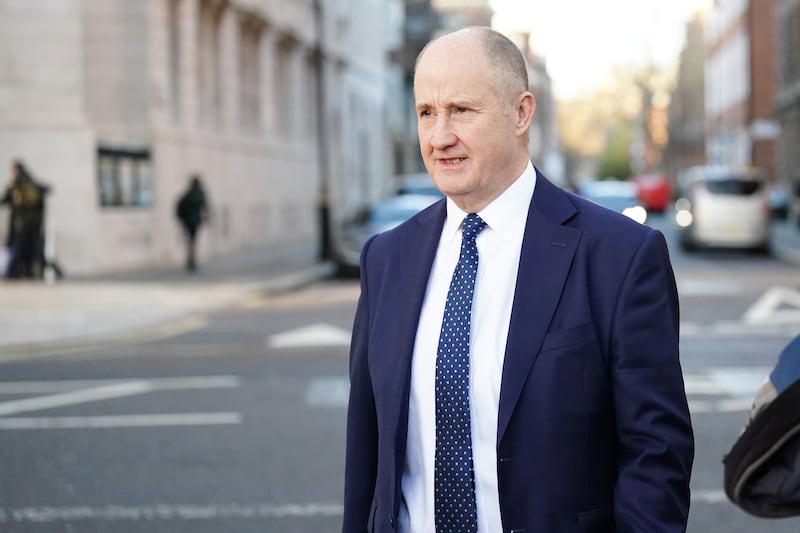The Government’s lack of action on ticket touting has been branded “pathetic” by Labour, as MPs heard of Taylor Swift tickets being resold for tens of thousands of pounds.
The House of Lords had previously pressed for a tougher stance on secondary ticketing platforms and attempted to make the Digital Markets, Competition and Consumers Bill stricter.
The Government disagreed with this and MPs voted to 273 to 163, majority 110 to overturn the Lords’ recommendation. A series of other disagreed amendments will also be returned to the House of Lords.

Business minister Kevin Hollinrake said the “groundbreaking” legislation will confer more powers and duties on the Competition and Markets Authority (CMA) to regulate digital markets, as well as enforce consumer protection law.
Labour’s shadow culture minister Sir Chris Bryant criticised the Government for failing to do the bare minimum, and said Labour will go further to crack down on “despicable” resellers.
In the Commons on Tuesday, Sir Chris said: “These people are despicable parasites, preying on fans, and we need to go far, far further to address this issue.”
He added: “In 2016, one ticket for Adele at the O2 arena in London was listed on GetMeIn for £24,840 – that’s 290 times the face value of the ticket. Nobody in the Rhondda would be able to afford such a ticket.
“The amendment that comes from the Lords does the bare minimum, it really does.
“It would require facilities to only accept postings if they provide evidence of purchase from the primary market, it would limit resale of more tickets than a single customer can buy on the primary market and it would require clear information on the face value, and traders’ business name and address on the first page of a secondary ticketing facility.”
Asked why the Government would not support the Lords amendment on ticket touting, Mr Hollinrake said the measures are already covered under current legislation, adding: “This Government has gone further, certainly a lot further than previous regimes have done, in terms of strengthening terms and guidance.”
Rhondda MP Sir Chris said if the Conservative refuse to act, Labour will “bring these measures in and go further”.
He also criticised the Government’s proposal for a nine-month review of the resale ticket market, adding: “The idea of a review in the dog-end of a parliament at the end of the regime is absolutely pathetic.”
Labour MP Barbara Keeley (Worsley and Eccles South) said: “The Government claim that it’s doing enough, it’s just not the case.
“Here’s an example: if the minister looks on a secondary ticketing site and sees three tickets together for a Taylor Swift show on June 22, going for £72,000 – tickets that had a face value of £170 each – how is this market working?”

Mr Hollinrake replied: “I agree, some of those examples are clearly shocking. The key is what measures are you going to put in place to address it?
“Now in Ireland, for example, they completely banned secondary sales, and yet the prices shown on the internet are an equivalent level to what she’s just described. So there is no perfect solution here for what’s been already tried.
“But we’re very happy to look at the evidence, look at what might be done, and do something that’s effective rather than something that is crowd-pleasing.”
Labour MP Sharon Hodgson (Washington and Sunderland West) said “scammers, fraudsters and overseas websites” would benefit if the Commons did not approve a Lords amendment to clamp down on ticket touting.
She added: “The minister in his opening remarks said that all of us on this side, all we’re doing is crowd-pleasing – well, I think he’ll find the crowd all have votes and this has been a fan-led campaign.”
Elsewhere in the debate, MPs voted 273 to 159, majority 114, to disagree with Lords amendment nine, which peers had made amid fears that big tech could use their legal might and finances to frustrate the competition watchdog.
The House of Lords had voted to restore the original wording of draft legislation relating to the power of the CMA to impose conduct requirements on firms.
There were concerns that a change made by the Government from “appropriate” to “proportionate” would widen the scope for decisions by the watchdog to be disputed by companies.
Before the vote, Conservative former minister John Penrose said he was worried that the “wrong people are clapping”, adding that the changes “seem to many people to be on the side of the big tech firms rather than on the side of consumers”.
Meanwhile, Conservative former minister Damian Collins said the Government had suggested the word change was a “tidying up exercise”, but he also noted: “There is a concern that this opens up, effectively, a sort of full merits appeal basis, something that we’ve been – in all the debates on this Bill going through both Houses – keen to avoid.
“And I think the Government has rightly resisted calls from big tech companies to bring that in, because that is a recipe for multiple and lengthy litigations, just as there is on every single measure of tech regulation that exists as a whole; that is not the intention.”
Mr Hollinrake defended the Government’s amendments to the Bill to allow for “targeted and proportionate” action against tech companies.
He said: “There were three aims behind the Government’s package of amendments at Commons report.
“The first was to provide greater clarity to parties interacting with the regime. The second was to strengthen the regime’s safeguards for the extensive new regulatory powers. And the third was to enhance the accountability of the regulator.
“The Government brought forward this package following careful consideration of the views expressed by honourable members across the House.
“We remain convinced that our amendments struck the right balance, that is between accountability of the CMA’s regulatory decisions and the flexibility to allow for targeted and proportionate action to tackle the unique competition challenges in digital markets.”
The Bill was amended to prevent UK newspapers being taken over by foreign states.
Mr Hollinrake said: “The Government knows that we cannot overstate the importance of these publications to our democracy. We, therefore, are taking decisive action to preserve the freedom of the press.
“By establishing a new regime within the Enterprise Act 2002, the Bill will prevent foreign states having ownership control or influence over a UK newspaper or news magazine.”









